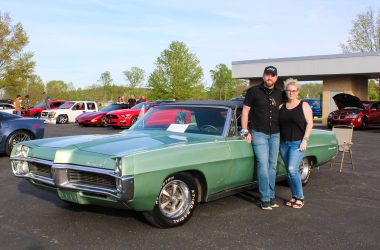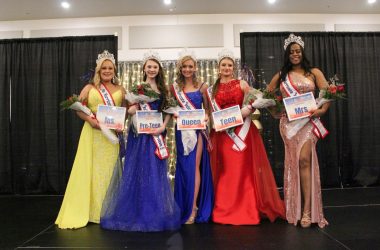Civil Rights activist Joan C. Browning was the special speaker for the May meeting of the Putnam County Democratic Women’s Club. The photo on the right is of Browning in the early 1960’s. (Photo by Betsy Allen)
Not only did Joan C. Browning live through one of the most tumultuous decades of the 20th Century, she frequently found herself in the midst of the tumult. During her college days in the early 1960’s, she became involved in the civil rights movement, becoming one of the famed Freedom Riders who traveled throughout the South to protest segregation.
Browning’s involvement in the civil rights movement and her experiences as a Freedom Rider were the focus of the monthly luncheon of the Putnam County Democratic Women, on Saturday, May 7, at the Eleanor Town Hall. The title of her lecture was “From Whence We Came and Where Do We Go From Here.”
Born on a farm in rural Georgia, Browning enrolled in Georgia State College for Women in 1959. She soon became involved in the civil rights movement. The freedom ride in which she rode was the last one, which took place in December of 1961. She was arrested in Albany, Georgia, shortly before Martin Luther King’s arrest in the same city. She relates that people often ask her if she followed Dr. King to jail, to which she replies that it was the other way around.
The Freedom Riders were activists who protested segregation by riding public buses through southern states from May through December of 1961. Although United States Supreme Court decisions Morgan v. Virginia (1946) and Boynton v. Virginia (1960) had deemed that segregation on public buses was unconstitutional, many Southern states continued to enforce segregation. The Freedom Riders brought public awareness to injustice and discrimination by riding interstate buses through the South. While riding a bus is a very passive act, the riders challenged the status quo by riding in interracial pairs and choosing seats which had been designated for whites only.
Freedom Riders came from a variety of social and racial backgrounds, and many of them were college students and young adults under the age of thirty. They often faced violent persecution for their defiance of the system. Angry white segregationist mobs, often organized by the Ku Klux Klan, would attack the buses and beat the riders with iron pipes, baseball bats, chains, and broken off bottles. Buses were bombed or set on fire, and in one incident, the mob tried to burn the riders alive by preventing their escape from a burning bus. Law enforcement would often look the other way when it came to the barbarity of the segregationist, and in some cities, violence against the riders was even sanctioned by local government. White Freedom Riders were often singled out for persecution, because the segregationists considered them traitors to their race. In addition to being subjected to mob violence, riders were arrested by law enforcement, their numbers filling local jails. To keep up morale and peacefully protest their situation, the riders would often sing freedom songs and gospel hymns.
Browning discussed the history of the civil rights movement, introducing listeners to some of the brave individuals who defied segregation and other discriminatory laws throughout the years. She also discussed some of the political history of Telfair County, Georgia, where she grew up. Corruption and racial discrimination were rampant there in the early 1960’s, and voting laws made it difficult for black voters to cast their ballots. Constituents had to use pencils when filling out their ballots, and many of those whose votes were counted had been dead for years.
After the Freedom Rides, Browning continued to work for racial equality. She volunteered with the Student Nonviolent Coordinating Committee (SNCC), one of the main student organizations championing civil rights in the 1960’s. She became involved with the Freedom Quilting Bee, a quilt co-op based in Alabama. Later she would come to West Virginia as part of the Cabin Creek co-op. She made Greenbrier County her home in 1976, and graduated from West Virginia State College (now West Virginia State University) in 1994.
After the conclusion of Browning’s lecture, Delegate Michael Pushkin thanked her for her life’s work.
The Putnam County Democratic Women’s Club meets every third Saturday at noon at the Italian Grille in Putnam Village behind Liberty Square.



